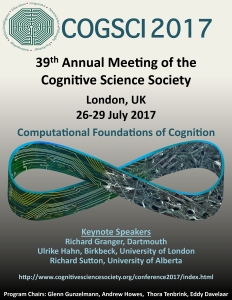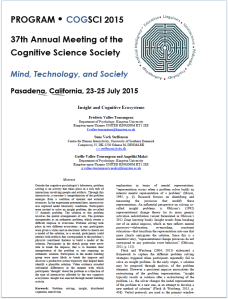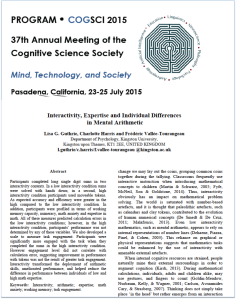SysCog Lab Research at CogSci 2017
Research from the SysCog lab was showcased at the 39th annual meeting of the Cognitive Science Society held in London in July 2017. Emma Henderson presented her work on interactivity and planning and Fred presented a paper on insight problem solving and ego depletion.

Planning in Action: Interactivity Improves Planning Performance
Emma Henderson, Gaëlle Vallée-Tourangeau, and Frédéric Vallée-Tourangeau
Planning is an everyday activity that is extended in time and space, yet is frequently studied in the absence of interactivity. Successful planning relies on an array of executive functions including self-control. We investigated the effects of interactivity and self-control on planning using a sequential-task paradigm. Half of the participants first completed a video-viewing task requiring self-control of visual attention, whereas the other half completed the same task without the self- control constraint. Next, and within each of these groups, half of the participants manipulated cards to complete their plan (high-interactivity condition); for the other half, plans were made with their hands down (low- interactivity condition). Planning performance was significantly better in the high- than in the low- interactivity conditions; however, the self-control manipulation had no impact on planning performance. An exploration of individual differences revealed that long-term planning ability and non-planning impulsiveness moderated the impact of interactivity on planning. These findings suggest that interactivity augments working memory resources and planning performance, underscoring the importance of an interactive perspective on planning research.
Interactivity and Ego Depletion in Insight Problem Solving
Frédéric Vallée-Tourangeau
In the triangle of coins problem coins are arranged to create a triangle pointing down and the solution involves moving a few coins to change its orientation. The task ecology can be designed such that participants can work on it in a low interactivity environment, maintaining a mental representation of simulated moves, or in a high interactivity environment, thinking with and through a physical model of the problem. These task ecologies involve working memory to a different degree: Problem solving draws more on working memory the lower the degree of physical interaction. Participants first engaged in a writing task that required vigilance to inhibit common word choices, a degree of self regulation designed to induce a so-called ego depletion; participants then worked on the ToC problem in either a low or high interactivity environment. Solution rates were determined by level of interactivity; the preceding depletion experience did not impact performance.
Systemic Cognition Symposium
The first edition of the Systemic Cognition symposium took place at the Kingston Business School on Tuesday July 25 2017. The symposium was co-organized by the Systemic Cognition lab (https://syscoglab.com/, Department of Psychology) and the Decisions, Attitudes, Risk and Thinking research group (https://dartresearch.org/, Department of Management). The symposium explored the theoretical and methodological challenges arising from the systemic study of cognition; that is, cognition as it emerges from the interactivity between an agent and the elements of the system within which he or she is embedded. Systemic elements may include other social agents, organisational and cultural practices and/or material artefacts. The programme and abstracts can be accessed here.

Systemic Cognition Lab Research at CogSci 2015
Research from the Systemic Cognition at CogSci 2015 (Interactivity and Mental Arithmetic)
https://mindmodeling.org/cogsci2015/papers/0152/index.html
Insight and interactivity presentation
Insight and interactivity at CogSci 2015: https://mindmodeling.org/cogsci2015/papers/0422/index.html

Increased interactivity and numeracy foster Bayesian reasoning
Ideally, we should be able to reason appropriately with uncertain information. In reality, research has shown that reasoning under uncertainty is often flawed and intervention efforts designed to improve Bayesian reasoning performance have met with mitigated success. Over the years, the accumulated evidence has tended to suggest that people’s poor performance in tasks requiring them to draw inferences based on statistical information is mainly due to reliance on heuristic thinking, as a result of their general lack of numeracy skills, lower cognitive abilities, or lack of motivation to engage in effortful thinking. We surmised, instead, that participants’ struggle to engage in Bayesian reasoning, together with researchers’ mitigated success in helping participants overcome their difficulties, originates from the material resources customarily used to present information in Bayesian problems—namely, paper-and-pencil questionnaires—because such resources severely constrain what participants can do to discover the correct solution. We report a series of three experiments showing that performance can be substantially improved when material resources afford richer interactions with the probabilistic information presented in the problems, independently of the information format used and without training. We conclude by discussing the implication of adopting a distributed cognition approach to better understand how people’s actual thinking capability may be realised within and outside the laboratory.
This paper was presented on the 20th August, 2.15pm during the 24th Subjective Probability, Utility and Decision-Making conference at the IESE Business School, Barcelona.
Additional resources
Here you’ll find two examples of our recordings of participants solving a Bayesian tasks using playing cards. The first participant was successful, the second wasn’t.
Part. 27, Problem 1, Successful:
Part. 24, Problem 1, Unsuccessful:



